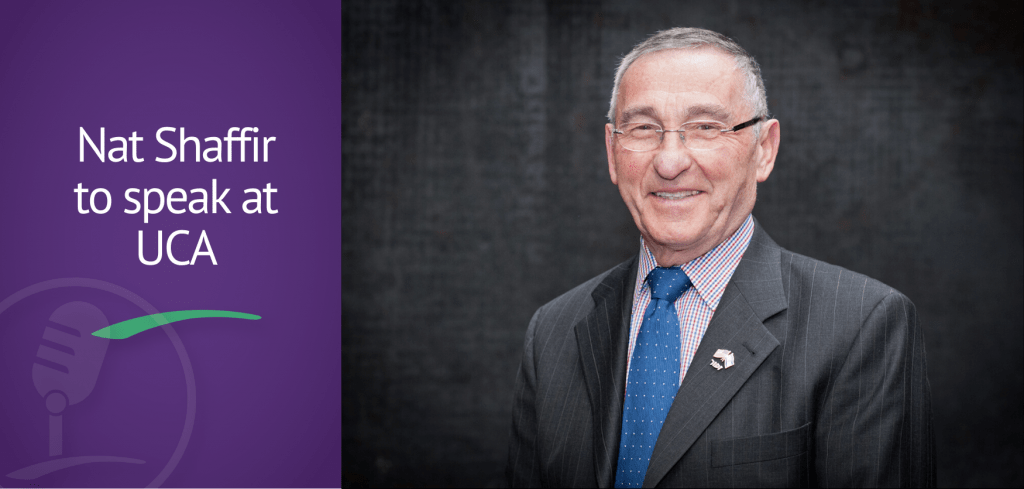CONWAY — The University of Central Arkansas will host “An Evening with Holocaust Survivor Nat Shaffir” on Wednesday, March 4 at 7 p.m. in the McCastlain Hall Ballroom.
The event is free and open to the public. Sponsors of the presentation include the UCA departments of English, History, Liberal Arts and Philosophy and Religion, as well as the University of Arkansas Community College at Morrilton and the University of Arkansas at Rich Mountain.
Shaffir’s visit to UCA is courtesy of the United States Holocaust Memorial Museum’s Office of Survivor Affairs, which offers schools, civic groups, military bases, and other institutions nationwide the opportunity to hear a Holocaust survivor share his or her experiences. Every year, the survivor speakers reach hundreds of different individuals at the Museum, across the country and abroad.
“One of the most powerful ways people understand history is to engage with someone who witnessed it,” says Diane Saltzman, the Holocaust Memorial Museum’s director of constituency engagement. “Holocaust survivors who volunteer at the Museum and speak to various communities nationwide provide that unique connection. They bring an incomprehensible past alive and add a powerful dimension to an encounter with Holocaust history.”
The Conference on Jewish Material Claims Against Germany estimates the number of living Holocaust survivors worldwide has fallen to 400,000, around 100,000 of whom live in the United States. Many are in their 80s and 90s.
About Nat Shaffir:
Nat Shaffir, formerly Nathan Spitzer, was born on Dec. 26, 1936, in Iasi, Romania, to Anton and Fany Spitzer, who owned a large, successful dairy farm that supplied dairy products to the Romanian army.
In November 1942, the Fascist Iron Guard visited the Spitzer’s farm with a priest who identified the family as Jews. The farm and all the cattle were confiscated. The family had four hours to pack up their belongings and were allowed to take only one horse and one wagon. They moved into the Socola neighborhood of Iasi. Nat and his sisters, Sara and Lili, were no longer allowed to attend public school.
In early 1944, Romanian military authorities took Nat’s father and other able-bodied men from Iasi to perform forced labor laying new railroad tracks. Iasi fell to the Soviet Army in August 1944 but Anton would not be liberated and able to return until the spring of 1945. By that time, most of the Spitzers’ extended family, who were in Transylvania when it was occupied by Hungary, had been killed. Fany’s father and 10 of her siblings had been transported to the Auschwitz-Birkenau and Buchenwald concentration camps. Her father later died of starvation in a forced labor camp. Two of Fany’s brothers, Moshe and Lazar Wax, survived to be liberated. Moshe died shortly after while on a ship heading to a sanatorium in Sweden; Lazar later immigrated to the United States.
After the Communists seized power, the Spitzer children were ridiculed by their non-Jewish classmates and excluded from Communist student groups. It became evident to Anton that continued antisemitism and discrimination provided an unsafe future for his family under Soviet control. In 1947, the Spitzers decided to leave Romania for Palestine, but their application for an exit permit was repeatedly denied. Eventually, Anton bribed local officials to secure passage to Israel. The Spitzer family left Romania in March 1950 aboard a cargo ship called the Transylvania and arrived in the port of Haifa just before Passover.
While in Israel, Nat served for three years in the Israeli army. In 1961, he moved to the United States and in 1969 started his own business. He married Merryl Rich of Atlanta, Georgia, in 1970. They have five children and 12 grandchildren and live in Maryland.
About the United States Holocaust Memorial Museum:
A living memorial to the Holocaust, the United States Holocaust Memorial Museum inspires citizens and leaders worldwide to confront hatred, prevent genocide and promote human dignity. Its far-reaching educational programs and global impact are made possible by generous donors. For more information, visit ushmm.org.
Latest news in Conway and for Conway Scene.


